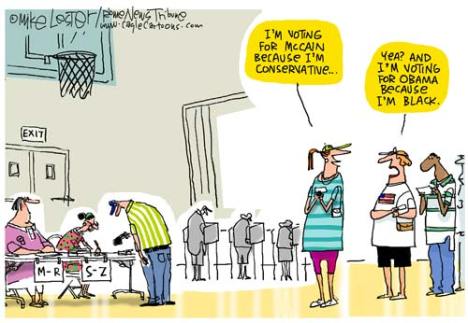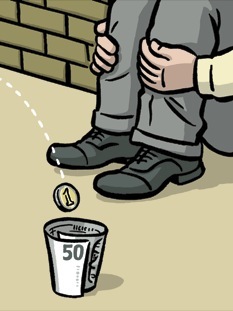All eyes are on the US election, and in Argentina it’s no different, with papers carrying plenty of commentary on the suspense gripping its northern neighbour and much of the rest of the world. According to a recent Latinobarómetro poll, each of the 18 Latin American countries surveyed showed a preference for Obama. Here in Argentina the editorials haven’t been keen to endorse, but what follows is a selection of what was in today’s opinion pages.
The conservative national daily La Nacion’s Martín Kanenguiser says the Kirchner administration, unlike many other foreign governments, is sure to miss George W Bush. “Since 2003, the North American doctrine of not sticking its nose into Latin American beyond Cuba and Colombia has allowed the Argentine government to play about with an erratic foreign policy that has neither drawn it closer to the developed world nor consolidated its regional alliances beyond photo-ops at regional summits or the selling of Argentine bonds to the extravagant Hugo Chávez.”
He mentions several ways in which the Bush administration has suited the Kirchners: Bush looked away when Argentina decided not to include 70% of the debt owed to its private creditors in its 2005 debt restructure, and he didn’t press for a continental free trade agreement that both his father and Clinton had pushed (the Kirchners’ trade policies are highly protectionist). “If the next US president decides to take a more intelligent view of Latin America, maybe the Argentine governent will have to make a bigger effort to be coherent, a quality that does not abound in its latest policies,” he says.
La Nacion also carries a column by former secretary for foreign and Latin American affairs (1996-99), Andrés Cisneros, who says “the arrival of a new North American president always awakes expectations of change, but in Latin America there won’t be much news: if we want change, we’ll have to create it ourselves.” He laments the current Argentine administration’s negative attitude towards the US, which he says has seen Argentine rendered itself irrelevant to its powerful neighbour in favour of a “jurassic 21st century socialism,” and indulgence in “adolescent dreams better suited to a group of student activists than the national administration.” He says Argentina has always had a strong tendency towards anti-Americanism, which whether justified or not, has allowed successive governments to always have on hand someone to blame for the country’s failures, even when the responsibility was entirely Argentina’s.
“The US may never be a close friend of Argentina’s,” he says. “We are not strategically important for them, we have nothing they want and they fear nothing we might do to them. But they are not our enemy. We should, then, try to ensure that they are not hostile towards us, and if we can, that they are not indifferent.” He adds that while Bush has fed the often justified anti-Americanism felt in the world and Latin America, the new president will offer an opportunity to turn the page.
The irreverent national daily La Critica has a column by lefty Martín Caparrós, where he’s his usual skeptical self, asking “has the US changed or has its black population merely changed? Have those blacks who wanted to live in a different country, a more just one, free of discrimination, decided that if they can live in this one, that now discriminates much more on a class basis than on a race basis, then everything’s OK?” He reminds readers that just as voting for a women doesn’t guarantee better deals for women (he names Cristina Kirchner, Angela Merkel and Maggie Thatcher as all having failed to push strong gender equality agendas), nor will a black president guarantee equal rights for black Americans.

While admitting to having found him inspiring early on, Caparrós today bemoans what he sees as the narrowness of Obama’s vision: that the middle classes pay a bit less in taxes and that he’ll talk to North Korea and Iran “because Kissinger says it’s OK.” “We all know,” he writes, “that the differences between Deomcrats and Republicans have to do with things that don’t matter to other countries: that rich Americans pay more or less taxes, whether abortion is permitted or not, whether gays may marry, whether schools teach that god made the world in seven days. On the larger themes, above all in foreign policy, there have never been big differences.” “I hope I’m wrong,” he writes, “but compañero Obama gives the impression of being, for us, more of the same.”
Pro-government Pagina 12 has a column by J.M Pasquini Durán, who says the new president will receive a unenviable legacy from the hands of Bush Jr, “one so grave and of such dimensions that it’s difficult to make predictions about the coming administration, one that will have to start working on the first day of the transition owing to the urgency of the situation.”
“The White House,” he writes, “will be hoping for support from a world which holds the US responsible, among other harms, for its decisive role in the warming of the globe, and at the same time its rejection of any sort of collective commitment like the Kyoto Protocol. There’s a whole library full of arguments against the conservative government that tried to steamroll anyone who disagreed with it, but these plays for power by the US president… are to be distinguished from the US people, who suffer the consequences and don’t deserve our indifference.” He warns readers: “If Obama wins, there will no doubt be change, but it would be prudent even in this case to remember that the US’s interests will be the same as they are now. What can and ought to change are their methods of pursuing them.”
Filed under: Uncategorized | Tagged: media, USA | Leave a comment »















